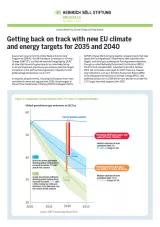Getting back on track with new EU climate and energy targets for 2035 and 2040
It is very clear that if the EU wants to make a fair contribution to the effort to limit temperature rise to 1.5°C, it will need to follow the recommendation of UN Secretary General Antonio Guterres and aim for achieving net-zero GHG emissions by 2040 rather than by 2050. This means the new EU 2040 target should become a net-zero target. It makes sense for the EU to set a very ambitious 2035 target of around 95% net GHG emission reductions at the same time.
To achieve such ambitious targets, the EU should implement at home what it agreed as part of the First Global Stocktake under the Paris Agreement: tripling renewables; doubling energy efficiency; phasing out fossil fuel subsidies and transitioning away from fossil fuel use; reducing methane (from all sectors); halting and reversing of deforestation and forest degradation; and transitioning to sustainable lifestyles and sustainable patterns of consumption and production.
The new European Commission should work, together with the European Parliament and the EU Member States, on the following four recommendations:
- Only by substantially reducing its demand for energy, materials and resources will the EU be able to achieve 95% emission reductions by 2035 and net zero by 2040. Consequently, the European Commission needs to develop sustainable material policies and an action plan to tackle lifestyle challenges, particularly in relation to transport, housing and diets, to cut energy demand by over 45% by 2040.
- Reducing energy demand should be complemented by action to phase out the production and consumption of fossil fuels. On an even shorter timeframe, the EU should end all forms of support, through subsidies and otherwise, for fossil fuels. The EU should set clear deadlines for all EU Member States to phase out coal use by 2030, fossil gas use by 2035 and oil use by 2040, in parallel to ambitious and binding renewable energy targets that increase the share of renewable energy to 75% in 2035 and 100% in 2040.
- New EU policies must ensure that those who stand to lose out economically from the transition away from fossil fuels get access to the benefits of the energy transition – be they countries, regions, industries, communities, workers or consumers. Hence, the EU must provide legislation to ensure social and ecological change benchmarks, deliver dedicated funding streams, support retraining, and promote social dialogue.
- Besides its energy transition, the EU also needs stronger policies that increase its land-based carbon removal capacity in ways that support biodiversity, as well as the rights of indigenous peoples and local communities. Agricultural policies need to align with the net-zero target and ensure they contribute to radical emission reductions from agriculture and livestock.
Back on track to Paris? Stock-taking of EU climate and energy targets beyond 2030 - Heinrich-Böll-Stiftung European Union
 Watch on YouTube
Watch on YouTube
